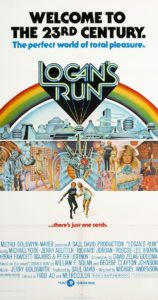 In most countries the young vote less than the old (though if someone champions them, as Corbyn did, their voting rates soar).
In most countries the young vote less than the old (though if someone champions them, as Corbyn did, their voting rates soar).
But the young are the very people with the most stake in how society is run. If you’ve got 60 years ahead of you, well, it matters that society is well run for those sixty years. If you’ve got ten, burn the house down to keep it warm.
This is related to the death bet:
The death bet is a bet that the cost of something will come after you die, while the benefits will occur while you are alive.
The classic death bet is climate change. If you’re old, well, most of the costs won’t hit while you’re still alive, but the costs of making change now would hit you now, so forget climate change.
A related bet was (and is, in many places) the long bull market in houses; housing prices rising faster than wages. This is obviously unsustainable, young people needing to take on more debt or being straight up unable to buy houses is obviously bad, but if you get in on the housing price rises, well, it’s all gravy for you.
So, the housing boom (and the stock market boom) are artifacts of the 80s. That’s when they take off in a sustained fashion. If you are GI Generation, Silent, or a Boomer this looks like a win to you. You get the property house rises, you sell for a lot more than you bought for, then you go to the South so that brown people can wipe your bum during your retirement.
There will be a cost in the future, but not for you. You win the death bet.
Worked for the GI Generation, worked for the Silents, and has worked for the first half of the Boom and some Xers.
A disaster for the Millennials, a lot of Xers and the next generation (whatever they’ll be called).
Death bet. I get the benefits and die before the costs come due. It’s the social equivalent of getting cancer, being told you’ll be dead for sure in two years, borrowing every cent you can and going wild.
So. Young people live with the consequences of decisions a lot longer than old people. They have a longer horizon. And they are hit by the leading edge of change from which old people are often insulated. If you bought your house when prices were low, high housing prices are almost entirely a good thing for you. If you were there for stock boom and had money to invest, all good. If you got the tax cuts of the neoliberal era, you got to spend that, and because the infrastructure was built with a time horizon of decades, most of it isn’t going to fall down on you.
Oh, old people can be wiser. They have seen more, and can have perspective. But they’ve learned the lessons of the past and what worked then, not what works now.
And the idea that they’ll do what is right because they care about their kids has been proven wrong over the last 40 years. Silents, GIs, and Boomers all knew about climate change (I’m old, I know it was widely known) and did nothing. They knew about housing prices, and that it would hurt their kids, and did nothing, except, sometimes, try and protect their kids at the cost of everyone else’s kids (I’m rich, I can buy my kid a house, who gives a fuck about anyone else).
Inter-generational altruism turns out to be pretty weak, especially once the kids leave. It was stronger in the past because the kids lived near or with the parents, worked in the same businesses, knew the same people, or plowed the same land or land close by.
Parents’ self interest required the kids do well at one time, but it mostly doesn’t now, and it turns out parents aren’t that altruistic.
Neither are kids, as best I can tell.
About 12 years ago my mother had cancer. She was due to die, so I flew out and sat with her for the last two weeks of her life, for which she was entirely bedridden, and she couldn’t talk for most of it.
My mother lived in British Columbia and they had a program where they’d put a caregiver in the house of terminally ill patients. So while I was there there was also a caregiver (mostly two, very kind young women). A nurse also visited twice.
The stories they told. According to them, I was very rare. Almost no one spent the last days with their parents. What they were used to was, instead, the kids coming in and taking the parents’ possessions before the parents were even dead.
Now I don’t claim to be a great son, I could have done more and didn’t, and I sure wasn’t the greatest to my Dad (because I didn’t like him). I would say I did the minimum.
The minimum is now unusual. Most kids are worse.
We mythologize families, but a lot, perhaps most parents, don’t actually do what is right for the adult kids, and their adult kids sure as hell don’t do what is right for their parents. (Yes, you are an exception. I was half an exception. But the palliative nurses saw many many families.)
We’ve created a society where incentives don’t line up to protect the future in a thousand ways (quarterly earnings calls, cashing out stocks, etc…) We’ve destroyed the fabric of extended intergenerational families, and we’re destroying what remains of the social safety net, while gutting basic research (the seed corn of technological progress).
Nor do we have much social feeling. We might, sometimes, take care of our own kids, but the kids of people we don’t know? Fuck’em.
So, perhaps one thing we can do is simply note that people who have to live with the consequences of decisions longer should have more say in the decisions. Start with a vote worth 1 at age 18, and discount it with generic actuarial tables going forward. How much longer does an average person at that age still have to live? What percentage is that compared to what an 18 year old has to live. Multiply. That’s your vote.
(Note that I am not young; this is not a suggestion motivated by self-interest.)
In truth, I offer this more as a thought piece than a serious suggestion (though it wouldn’t bother me if implemented, either).
But why not do it? The middle-aged to old have almost all the power in our society anyway. Look at all the old CEOs and senators and so on running around.
Of course, it might mean the end of pensions. But maybe pensions should be replaced by a universal welfare benefit, which everyone gets, anyway. Pensions are a pretty stupid way to do what they do in rich societies which would benefit from less activity, not more. (That’s a whole other article, but…)
So, should young people have more of a vote than old people? Can parents be trusted to vote in a way which protects their own kids futures, let alone the futures of other people’s kids? Are kids selfish bastards too? Is our society a pathological mess?
The results of the work I do, like this article, are free, but food isn’t, so if you value my work, please DONATE or SUBSCRIBE.

